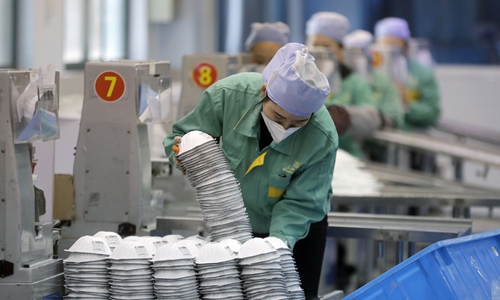HOME >> SOURCE
China’s SOEs develop full industrial chain to make face masks
By Zhang Hongpei Source:Global Times Published: 2020/3/5 22:03:40

An employee of Chinese face mask maker Dasheng Health Products Manufacture Co works at the company's factory in Shanghai, East China on Friday. Photo: Yang Hui/GT
Chinese state-owned enterprises (SOEs) have played a bedrock role in the fight against the deadly coronavirus. Apart from rushing huge donations to hard-hit Hubei Province, they have also wasted no time responding to emergent market needs by exploring and developing a full industrial chain to produce key health products.
China Petroleum & Chemical Corp (Sinopec), the state-run oil giant, has established a full industrial chain including from upstream to downstream products: polypropylene, a special material to make melt-blown fabric, the melt-blown fabric itself and the ultimate product - face masks.
The company announced on February 24 that it will invest 200 million yuan ($28.8 million) to build 10 melt-blown non-woven fabric assembly lines in Beijing and East China's Jiangsu Province, with the two lines in Beijing scheduled to start partial production in March and other assembly lines to start from April, according to a statement Sinopec sent to the Global Times.
Production lines in Beijing, which could go into operation on Sunday at the earliest, are estimated to generate 4 tons of melt-blown fabric for making 1.2 million high-level N95 masks, which are needed by frontline medical workers.
China doesn't make much melt-blown fabric and the expanded production lines can hardly meet the growing speed of the downstream mask-making machines, posing a bottleneck for the whole industrial chain, a Sinopec spokesperson said.
From Tuesday, Sinopec began selling disposable masks at 50 of its gas stations in Beijing with a daily supply of 30,000 masks. Each customer is limited to buy 10 masks per week at a cost of 3.5 yuan.
And, state-run shipbuilding giant China State Shipbuilding Corp dispatched its first batch of N95 mask-making machines on Tuesday, each producing 60 masks per minute. A total of 30 such machines could roll off the line by the middle of this month, the company said.
"It is a smart move by the SOEs to leverage their material advantages and help ease market supply pressure, which is mostly out of their responsibility to stand up and help the country in time of emergency," Dong Xiucheng, professor at the University of International Business and Economics, told the Global Times on Thursday.
"It remains to be seen whether the SOEs would keep their mask assembly lines in operation after the epidemic comes to an end someday," said Dong.
The work resumption rate of centrally administered SOEs and their subsidiaries has so far surpassed 90 percent, official data showed.
The National Development and Reform Commission, China's economic planner, said on Monday that China's daily capacity and output of masks have both exceeded 100 million per day, largely easing the supply-demand gap, fivefold the production capacity one month ago.
In overseas markets, masks remain in very short supply. There were 14,942 confirmed cases of coronavirus infection outside China as of Thursday, with South Korea, Italy, Iran and Japan having seen the most infection cases.
A report from South Korea's KBS said on Thursday that the government has said each person can buy at most two masks per week. The country's confirmed cases surpassed 6,000 on Thursday.
South Korea's daily output of masks is 10 million and the government has ordered manufacturers to supply 80 percent of the output, from the previous 50 percent, to post offices, pharmacies and agricultural cooperatives. And, the government said mask exports would be banned from Friday.
In Japan, where a mask supply crunch is lingering, people also find masks out of stock in stores or subject to purchase limitations. Candy, who lives in Kyoto, told the Global Times on Thursday that "if you queue early in the morning outside the drugstores, you might have the luck to get one but maybe only one as some stores have restrictions."
Posted in: INDUSTRIES